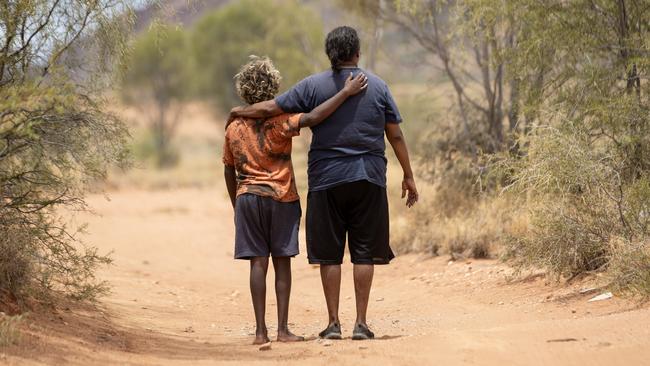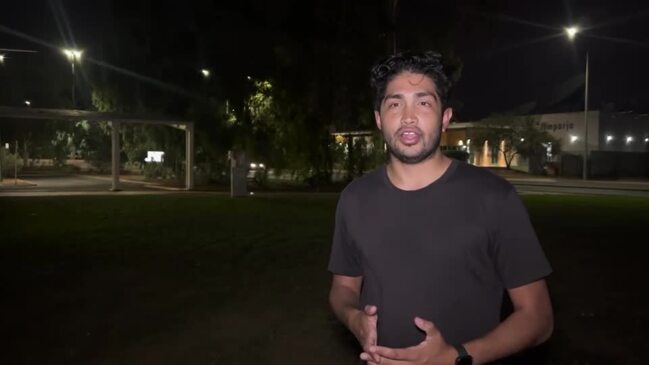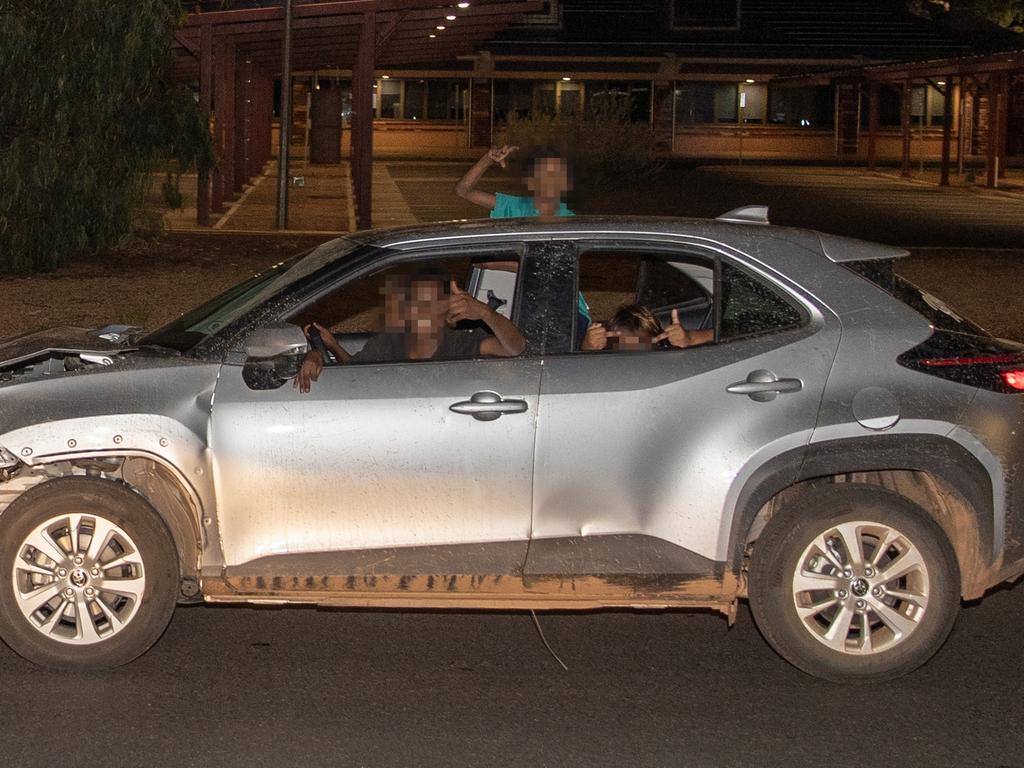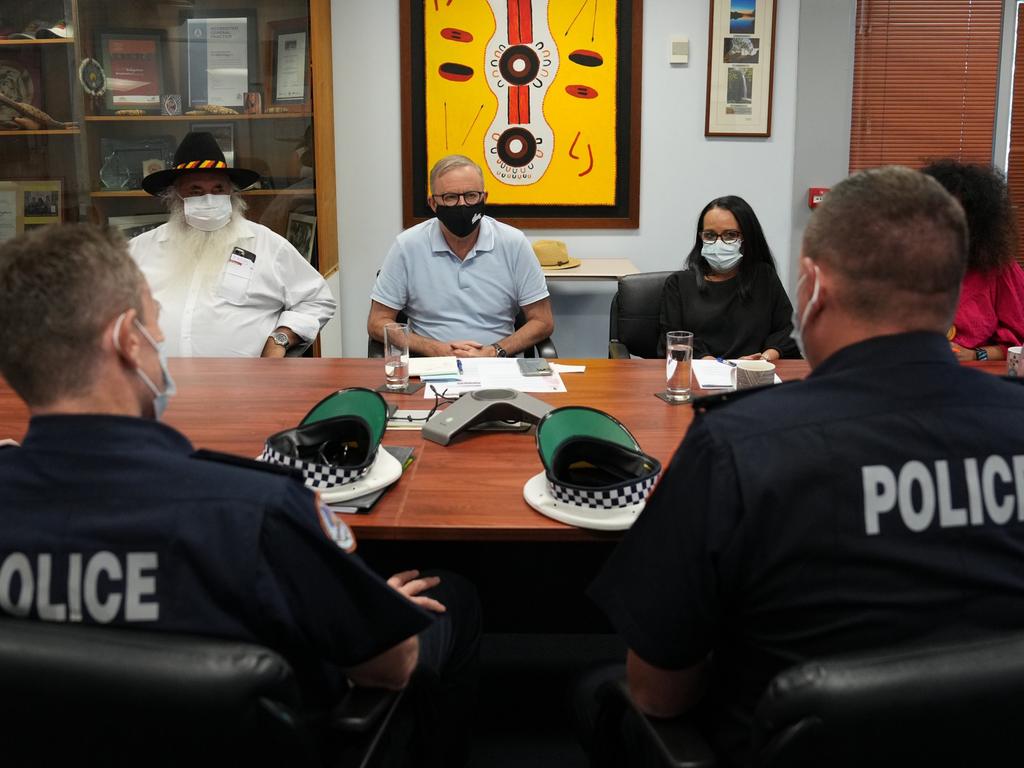Alice Springs youth crime: Age 12 and stuck on a turnstile of crime
William wants to be a police officer when he grows up. But for the past two years, the 12-year-old has been on the wrong side of the law.

William wants to be a police officer when he grows up.
But for the past two years, the 12-year-old has been on the wrong side of the law.
Last week he was caught by police behind the wheel of a stolen Toyota SUV that he drove wildly and dangerously through the streets of Alice Springs.
It’s the sixth time he’s been caught joy-riding in stolen cars – on each occasion returned by police to his extended family, only to reoffend.
But on this occasion he’s become the focus of renewed attention on a national crisis – a turnstile of out-of-control crime, often involving children as young as 10.
The Australian captured photographs of William (not his real name) and three mates last week as they drove through town, hanging out of the windows, yelling and taunting police.
They mounted roundabouts, careened through red lights and performed doughnuts on council lawns and drove on the wrong side of the road until the car ran out of petrol and was abandoned.
William was arrested, taken to the watch house and then returned to his home in a town camp where – not for the first time – officers lectured his grandfather. The boy lives with his aunt and extended family, who look after him because his parents “drink too much”.
“My father was having a yarn with (the) policeman, and the policeman was telling him he’s not allowed to go to town and doing the same thing,” said his aunt, who The Australian has chosen not to name.
She’s tried to keep William at home at night but he won’t listen, “I’m telling him ‘how come you’re driving the car round with kids, it’s too dangerous’,” the aunt says.
As William is shown photographs of the late-night joy ride taken by The Australian, he shrinks into his chair and goes very quiet.

Gone is the bravado; in its place is a frightened child.
He pulls his shirt up to cover his eyes, which are welling up. He’s upset, and trying to hide it. He knows he’s done wrong.
William is shy, and although he can speak English, Pitjantjatjara, the dialect of the Western Desert language traditionally spoken in his community, is his first language.
“He’s telling it’s too dangerous to drive as a kid, 12 years old,” his aunt translates.
William cracks a little smile as I suggest he try go-karting and show him a photo of me on a motorbike.
William appears to be an inquisitive, intelligent kid.
His aunt says William’s parents, in their 50s, are alcoholics.
“The little boy grew up with me when the mother and father was drinking,” she says.
“I’m the one who grew him up. He was a good boy till he is about 10 years old.
“He always used to come to school when he was about seven, eight, nine years old, but the locals in town camps, those kids take him after school, forcing him and they go to steal and break in.
When he was 10, William went back to live with his parents. But in the past few months, he’s back living with his aunt.
She takes him to a youth centre in Alice Springs daily, but she says her nephew is influenced by other children who lead him astray.

William’s aunt is doing her best, but she is struggling. Her eldest son is in prison, and due to a family dispute she’s had to move house, but she’s deeply concerned about William.
“I need some people to help me out. I am his only hope, there’s no other relatives,” she says.
She says his mother and father keep Centrelink payments – meant to support William – for themselves.
“Mother and father never buy anything out of his money; they just spend it. They don’t buy games, clothes, they don’t buy anything for him, that’s why he was going and breaking things when the mother and father was looking after him.
“He got nothing out of his payments, that’s why he’s going out stealing things.
“They drink a lot, that’s why he don’t want to go to the mother and father. They don’t fight, they just drink too much.”
She fears William will follow the path of three of his four older brothers who “grew up in prison” and “break in, steal grog, steal cars and steal money”.
“I’m afraid he might end up being like the older brothers, being in and out of prison,” she says. “I want to help stop him from doing that.”
She believes boarding school, possibly interstate, could be a solution. She says youth services, such as Brown Street, run by taxpayer-funded Tangentyere Council, which are meant to help children such as William, aren’t helping. Instead, they’re introducing him to the “wrong crowd”.
“There’s kids there forcing him to run to town, they are boss of him,” she says.
Gavin Morris, principal at Yipirinya, an independent school for children who live in the town camps of Alice Springs, says there are dozens of kids in this type of situation.
Through Yipirinya’s Happy Heart Hub, Dr Morris has developed a “holistic healing informed model”, designed to give students and families strategies to deal with trauma and help disengaged kids get back into school.
“The living conditions of our students are a blight on the conscience of our nation,” Dr Morris says. “Town camp children have to overcome barriers that make access to education far more difficult than children who come from other areas of the Alice Springs community.
“The children of Alice Springs deserve more, they deserve to have an education and a life pathway which would be expected from any child across Australia.”
Meanwhile William’s aunt is planning to buy a TV for him next week when she gets her pay cheque. It’s the only way she can think of to keep him off the streets. “I’m running out of ideas. I don’t want to let him go,” she says. “And there’s nobody else who can help him.”





